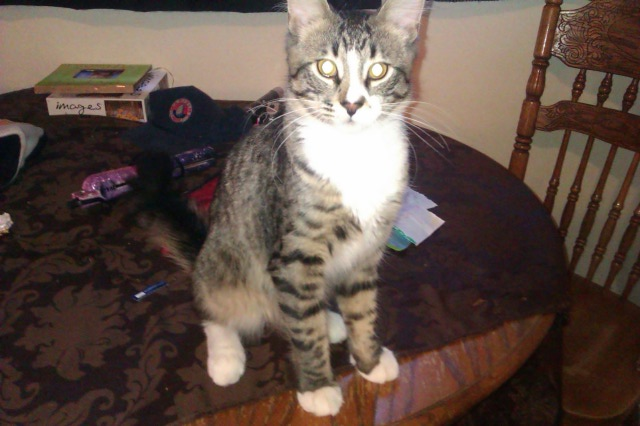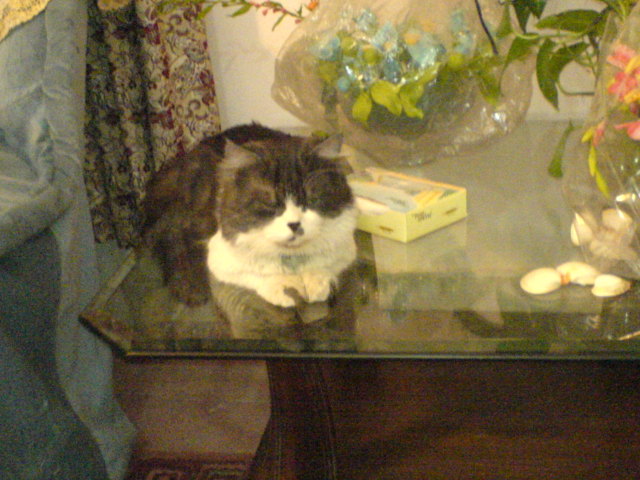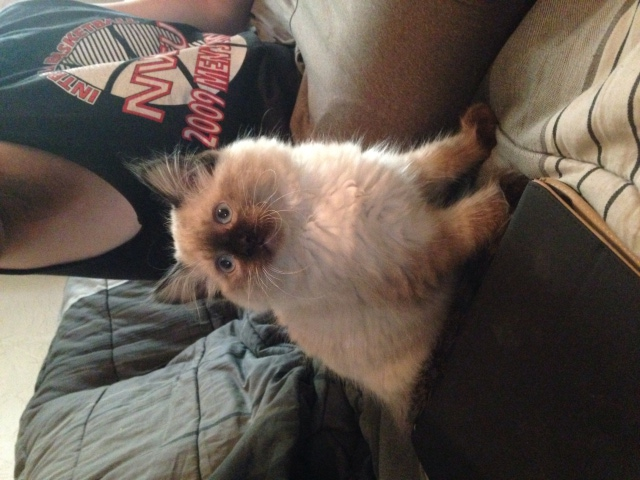Question
AnswerHi Carol. It sounds like the one thing you haven't tried is drug therapy. Fortunately, drugs can work in more than 70% of cases that don't respond to the other methods you've tried.
It sounds as though your cat is likely spraying due to anxiety in addition to habit. From your description, the cats in the cattery he came from were also likely suffering from anxiety. It could've been from crowded conditions or other stressful situations, or there could be anxiety disorders in the bloodlines. Either way, your kitty may be afflicted with anxiety because of his experience there, or because of his genes.
The newest drug of choice for this behavior is Prozac (fluoxetine). It seems to be the most effective of a list of antianxiety medications that have been used - Buspar (buspirone), Elavil (amitriptyline), Valium (diazepam), and Clomicalm (anafranil) are among the most common. Each of these has uses for anxiety disorders, but fluoxetine tends to work best for cats who are showing anxiety through spraying or through self-mutilation. It also, unlike the others, has no side effects, so it's the most desirable drug to use when possible.
Another possibility would be injecting your kitty with estrogen, such as Ovaban and Ovarid, which are actually designed as birth control for cats and dogs. Basically, placing him on a high dose of these female hormones for a few weeks will cause him to feel like a female. Females are far less likely to spray, and often times the male will stop spraying during this time. Once the habit's broken, many won't start again.
The hormone method alone doesn't tend to be as effective as the antianxiety medications do, so they're normally used in conjunction with the antianxiety treatment to provide immediate relief. Antianxiety medications can take 6 weeks to reach full effect. It's important to note, too, that hormonal treatments carry heavy side effects with longterm use, so 2-3 weeks is really the limit that such a treatment should be used unless there is absolutely no other choice.
It's also very important to clean urine stains properly. Since a cat's sense of smell is 14 times more sensitive than a human's, cats can smell stains you THINK you've removed. And as long as there's a scent there, he'll return. Here's how best to clean accident areas.
You should clean the accidents up with an enzymatic cleaner. Cat urine is full of fat, which is very sticky. This is why cat urine stains are so hard to remove. Enzymes break down fat molecules to allow for complete removal of the stain. The two enzymatic cleaners I recommend are Nature's Miracle, available at pet stores, and Greased Lightning Orange Blast, available at grocery stores. Unless you remove the stains completely, the cat will still be able to smell it, even if you can't. You may also want to use a fluorescent black light to detect unseen urine stains. Any urine stains will glow yellow-green.
I really hope these will help. It's unfortunate that not 100% of cases can be solved, but nearly all can. If you can't tolerate his behavior any longer, consider retiring him to a pet retirement home, where he'll be able to roam free under protection, like this one:
http://www.wildcatranch.net/wildcat.htm
It costs money, but it's really the most loving thing you can do for your kitty if you can't keep him any more.
Aside from that, a no-killer shelter may be an option, but do remember that he may have quite a stay there until he finds a loving home. Check this list:
http://www.sheltersearch.net/shelters/index2.html
But please also read:
http://www.stmartinhumane.org/no_kill_shelters.htm
Good luck! Please keep me updated.

 What Breed Is My Cat ??
Question
Cloud1 Cloud2
Hey, my boyfriend a
What Breed Is My Cat ??
Question
Cloud1 Cloud2
Hey, my boyfriend a
 Persian Male Behavioral Issues.
Question
Jimmy
Dear Karen
Hope you are fine. I
Persian Male Behavioral Issues.
Question
Jimmy
Dear Karen
Hope you are fine. I
 What kind of cat do I have? What should I breed her with?
Question
What kind?
The people we got my cat fro
What kind of cat do I have? What should I breed her with?
Question
What kind?
The people we got my cat fro
 wonderin??
Question
CIara
Hi Karen,
This is my first time dealing
wonderin??
Question
CIara
Hi Karen,
This is my first time dealing
 The breed of my 5 1/2 month old kitten
Question
Edmund 5 1/2 months ol
Hi, my husband and I re
The breed of my 5 1/2 month old kitten
Question
Edmund 5 1/2 months ol
Hi, my husband and I re